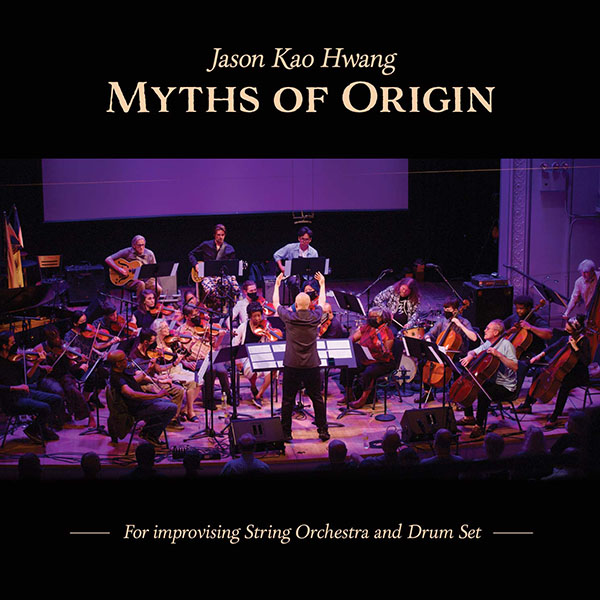Myths of Origin forges a unique language free from the expectations of ethnicity and genre, to revolutionize our relationships to each other.
I utilize a lexicon of gestures to conduct and empower improvisations that engage my notated score. The musicians infuse their individuality into a flow of spontaneous moments that illuminate possibilities for the journey ahead by revealing truths of who we can become. To be transformed by possibilities grounded in truth, is to transcend all Myths of Origin.
Liner Notes by Scott Currie
Myths of Origin literally starts with a bang, answered by a solitary twang, punctuated by another sudden drum stroke and then another, cuing the entrance of high diaphanous tone clusters from the strings. Whether evoking the ancient sounds of Japanese gagaku for some listeners or the modernist sonorities of a Penderecki threnody for others, depending on cultural frames of reference, this dramatic introduction immediately engages everyone in the cosmopolitan sonic world of Jason Hwang’s musical alchemy, amalgamating and transmuting jazz, contemporary, and world music, subverting and sublating conventional hierarchies of East and West, old and new, high and low, noble and base – and all without a single note played from the printed page as of yet. Nonetheless, the clarity of Jason’s conception is so clear that this conducted ensemble improvisation stamps each performance with his distinctive artistic signature, so powerfully that – if there weren’t so much great music still to follow – one might be tempted to replay the track to savor its delicate beauty once again.
At its best, as illustrated here, conduction fuses improvisation and indeterminacy, with a composer-bandleader determining the ultimate shape of a musical work in progress while directing its continuous flow. Having worked with many of the pioneers of this innovative real-time compositional technique, including Butch Morris and Karl Berger, Jason premiered his unique approach to improvising-orchestra conduction with his Spontaneous River ensemble’s Symphony of Souls (2011), and honed kindred conceptions throughout the various chamber-ensemble projects he has led over the years since. Myths of Origin showcases the flexible aesthetic he has developed, which integrates notated ensemble passages, extemporized solo statements, and conducted ensemble improvisations, cued by an economical system of largely intuitive gestures that facilitate and shape the musical flow, while giving players the co-creative agency to be themselves and thus fostering their sense of individuality within the collectivity. After giving impassioned voice to his own individual muse in his previous solo-improvisation project Soliloquies, Jason now trades violin for baton to focus on the collective dimensions of ensemble improvisation, effectively playing the entire orchestra as his instrument.
All of this, of course, sounds great in theory, but how – one might well ask – does it actually work in practice? Just listen to the solos, one after another, each as eloquent and expressive as the last, collectively testifying to Jason’s ability not just to assemble one of the most talented rosters of improvising strings on record, but also to create the musical settings that inspire the very best from them all, as they take virtuosic impetus from propulsive rhythms, weave lyrical cadenzas around fleeting harmonies, and inevitably discover new melodic paths to explore within the work’s carefully charted soundscapes. From the wailing guitar solo by Anders Nilsson in “Spin Fast and Burn,” through the freewheeling conversation among violinist Elena Moon Park and cellists Dara Bloom, Kirin McElwain, Lester St. Louis, and Tomas Ulrich in “Dust Gathers Around Sleep,” to the impassioned dialogues between guitarist Che Chen and violists Ginger Dolden and Pete Lanctot in “Ancestors of Light,” the kaleidoscopic combinations and permutations of talent showcased here cannot but impress.
But the essential meanings of this conduction transcend the brilliance of its constituent solos, as they arise more fundamentally from the generative dynamic tensions – between structure and agency, consistency and contingency – that Jason establishes between the work’s score and its ensemble, each an efflorescent elaboration of a seminal core. In its various extant realizations from premiere to recording, Myths of Origin always begins with a collective improvisation and ends with a composed theme – as here with “The Collapse of Gravity” and “Never Forgotten” – building initial climactic intensity in between with soloing over a funk vamp – here “Multiply and Rise” – that gives way, after a conducted interlude, to the unison melody heard in “Dust Gathers Around Sleep.” Appropriately enough, the violinists taking funk solos here include Charles Burnham, Ben Sutin, and Rosi Hertlein, who have played central roles over the course of this ensemble’s evolution, alongside violist Eric Salazar, Tomas Ulrich, guitarist Hans Tammen, bassist Ken Filiano, and drummer Andrew Drury (almost all of whom recorded in Jason’s earlier Spontaneous River orchestra). Together with these constellations of fixed stars on the page and the bandstand, which have endowed the work with its enduring identity, what makes the version on this recording definitive is the way Jason builds around these ensemble stalwarts and compositional pillars to feature new stellar voices and conceive new musical myths that further expand upon his originary vision. So come join all the heroes of this tale – from Jason’s longtime collaborating team of master artists like Mark Chung, Gwen Laster, Melanie Dyer, and Judith Insell to such exciting new talents as Keir GoGwilt, gabby fluke-mogul, Tom Swafford, and Johnna Wu – and follow their pilgrims’ progress through each unfolding adventure recounted here. Ultimately, as satisfying as you’ll doubtless find each telling and retelling, you’ll also find yourself wondering where Jason might take the saga from here.
